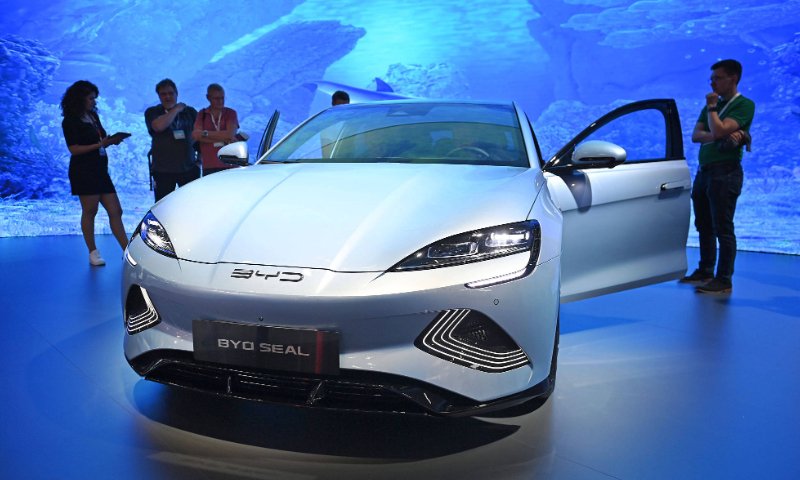When Chinese electric vehicles (EVs) dazzled attendees at the 2023 International Motor Show in Germany, Europe’s subsequent reaction was unforeseen and excessively strong. The European Commission’s president, Ursula von der Leyen, declared the initiation of an anti-subsidy investigation into Chinese EVs on September 13. Such an impulsive move by the European Union (EU) is not only hasty but also misguided.
The Basis of the EU’s Investigation and Its Misalignment
The EU’s claim that Chinese EVs benefit from “enormous state subsidies,” which result in undercutting European market prices, is questionable. Contrary to this assertion, Chinese EVs command considerably higher price tags in Europe than in China. Inversely, certain European EVs are more affordably priced in the Chinese market.
The increasing popularity of Chinese EVs in Europe isn’t a result of subsidies. The winning combination has been their emphasis on innovation, technological growth, cost-reduction, and improved quality. This formula has earned them the European consumers’ trust and admiration.
The Misconception Surrounding Chinese EVs in Europe
Chinese EVs aren’t a threat to Europe. Instead, they have proven to be an asset. European-made EVs typically come with substantial price tags. The presence of Chinese EVs offers Europeans enhanced choices that are both superior in quality and more economically viable. Any action to suppress Chinese EVs would only hinder the cost-effective options that Europeans have recently started to enjoy.
A revealing comment came from a European Union diplomat who stated, “We cannot afford to lose our car industry.” Such a sentiment underscores the underlying motivation for the EU’s recent decision: a veiled attempt at protectionism, packaged as “fair competition.”
The Flawed Strategy of Protectionism
Time and again, trade protectionism has shown its pitfalls. The EU, in its attempt to shield its car industry, might be overlooking a significant drawback. The European automotive sector, for years, has been resting on its laurels, which has inadvertently stagnated its innovative drive in the EV sphere. To truly evolve and be globally competitive, the industry needs to venture beyond its comfort zone.
It is imperative for Europe to foster a genuine competitive spirit. Keeping the EV sector in a protective bubble will only inhibit its growth and resilience. The entry of Chinese EVs should be seen as an impetus for European manufacturers to push their boundaries of innovation. Erecting trade barriers won’t bridge the innovation gap; in fact, it might widen it.
As rightly pointed out by the Chinese Ministry of Commerce, the auto industries of both regions have cultivated a symbiotic relationship. This means that any damage inflicted on one is bound to reverberate on the other.
Reflecting on Market Diversity
The essence of the Chinese market’s diversity is evident when one observes the variety of international cars on its roads. While German roads predominantly feature German cars and French roads highlight French models, Chinese streets showcase a global array. Such diversity and openness is a testament to China’s inclusive market approach, and Europe should recognize and appreciate this.
In trade, just as in interpersonal ties, reciprocity is fundamental. Both China and Europe must foster an equitable and stable market environment for the collective growth of the electric vehicle sector. This involves eschewing trade protectionism and jointly tackling global issues such as climate change and aiming for carbon neutrality.
Revisiting the Shadows of the Past
Interestingly, the EU has been on the receiving end of protectionist measures. When the US implemented the Inflation Reduction Act last year to shield its domestic sectors, Europe was vocal about its disapproval. Now, adopting a similar mindset towards Chinese EVs, the EU must introspect about the path it’s choosing.
Von der Leyen’s reference to the solar industry debacle is a noteworthy point of reflection. Back in 2013, following the US’s lead, the EU imposed anti-dumping tariffs on Chinese solar panels, accusing them of “unfair subsidies.” This decision did more harm than good. European solar companies, in the absence of genuine competition, began importing Chinese panels via alternative channels, incurring increased costs.
Conclusion: Lessons from the Past and the Way Forward
History teaches us that protectionism can’t be the solution. It’s often counterproductive. The way to resolve trade disputes is through dialogue and mutual negotiation.
From the solar industry’s experience, two primary lessons emerge. First, protectionism isn’t a sustainable strategy. Second, trade disagreements are best resolved through mutual dialogue.
It’s crucial for the EU to glean insights from past missteps. Instead of being swayed by political narratives, the EU must heed the voices of its business community and promote an environment conducive to genuine competition. After all, true growth and excellence can’t be achieved in an overprotective environment. Just as tall trees need open skies to grow, and mighty eagles vast skies to soar, industries need open markets to truly thrive.
Read More:
